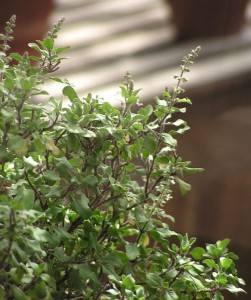
Tulsi is known as Holy Basil in English. Its scientific name is Ocimum tenuiflorum. It is known as Kaphrao in Thai language and Maduruthala in Sinhalese.
Tulsi has strong aroma and stringent taste. It means ‘the incomparable one’ in Sanskrit.
Hindus make extensive use of Tulsi. Its leaves are used as offering to God Vishnu. They are also used as household medicine to cure several common body ailments like cold, cough and fever. Because of its use in worship, it is a sacred plant for Hindus. It is a common name among Hindu girls.
Its leaves could be consumed raw or they could be consumed in the form of tea. Tulsi herbal tea is quiet popular throughout the world. Dried Tulsi leaves are used as insect repellent in Sri Lanka. It is used extensively in Thai Cuisine.
According to Hindu Puranic stories, it is an expression of Goddess Sita. Hindus have the tradition of keeping Tulsi plant in home, generally in small pots. This tradition is fast fading because of urbanization.
It is very easy to grow Tulsi plant, it is not an indoor plant, it needs fresh air and sunlight. It has a short lifespan ranging from one to two years if proper care is taken.
There is a story about Saint Kabir and Tulsi. When Kabir was ordered by the King to appear in court on the complaints of clerics, Kabir gets ready to go to court by putting a peacock feather as crest and Tulsi garland around the neck. It is said that Kabir looked super bright on that day in his simple attire and wonderful fragrance was emanating from him.
There is a popular Bollywod movie in the name of Tulsi – Main Tulsi Tere Aangan ki. The main character of hugely popular Indian TV Serial Kyonki saas bhi kabhi bahu thi was named after Tulsi. American politician Tulsi Gabbard is also named after the holy plant.